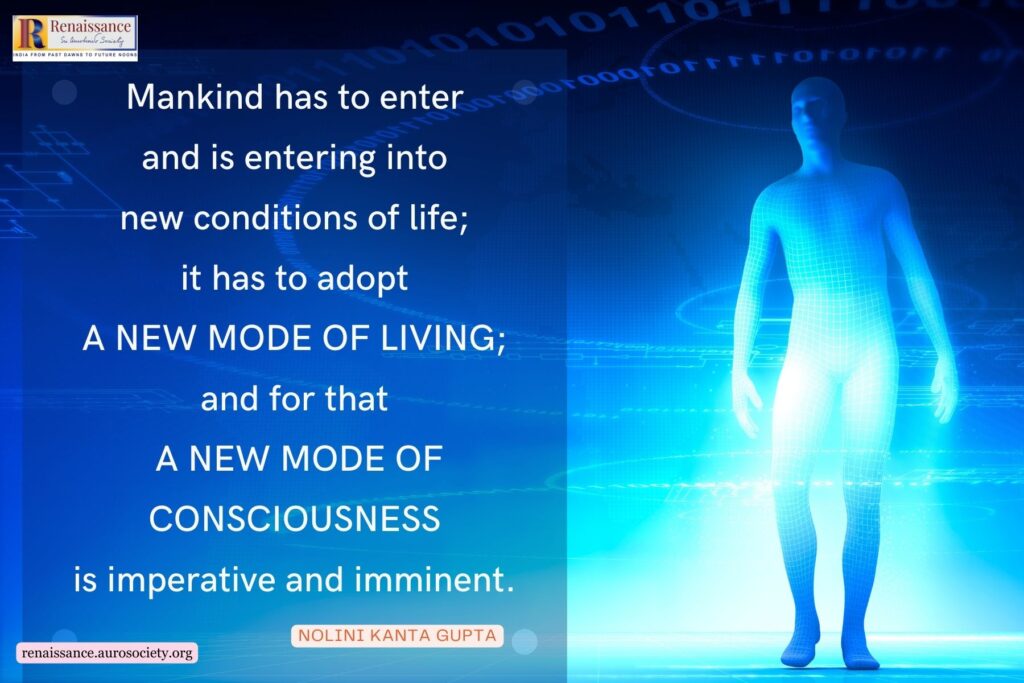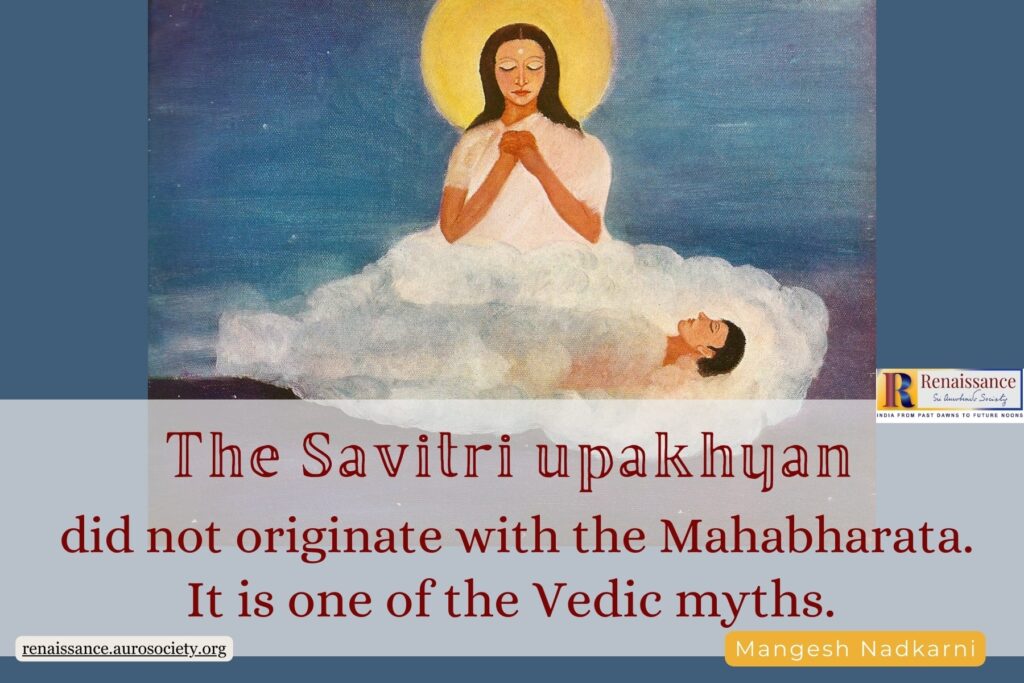Editor’s note: In the last four issues we serialised Dr. Prema Nandkumar’s essay focusing on the Ramayana in the light of Sri Aurobindo. With this issue, we begin with her essay on the Mahabharata, which was first published in the 1985 annual issue of Sri Aurobindo Circle. As with the Ramayana essay, we will present this one also in several parts. We have updated the references and made a few formatting revisions done for the digital presentation.
For the essay on the Ramayana, click: PART 1, PART 2, PART 3, PART 4

Vyasa: Social Scientist
There are several streams of thought through which Sri Aurobindo must have approached the Mahabharata. A cardinal approach is likely to have been that of the political thinker who sought a way out of the historical tangle of political administration in India that had, between Chanakya and Islamic autocracy and European moulds, brought chaos into the nation’s social life.
At the beginning of the 20th century Sri Aurobindo wondered whether the country would, after all, have to rattle on from bad to worse on the existing rails.
Presently he entered the world of Vyasa and found that a polity suited to the Indian genius had flourished at one time and might still help us in some respects if only we could boldly opt once again for some of its features with necessary modifications to meet the present needs.
Writing in the Bande Mataram on 22 March 1908 about the old Aryan idea of a limited monarchy, he said:
The Council of Chiefs is a feature of Indian polity universal in the time of the Mahabharata. That great poem is full of accounts of the meetings of these Councils and some of the most memorable striking events of the story are there transacted. The Udyoga Parva especially gives detailed accounts of the transactions of these Council meetings with the speeches of the princely orators.
The King sits as President, hears both sides and seems to decide partly on his own responsibility, partly according to the general sense of the assembly. The opinion of the Council was not decided by votes, an invention of the Greeks, but as in the older Aryan systems, was taken individually from each Councillor.
~ CWSA, Vol. 7, p. 944
Describing Vyasa as a “granite mind in which impressions are received with difficulty but once received are ineffaceable”, Sri Aurobindo drew our attention repeatedly to the pragmatic outlook of our Aryan ancestors.
Vyasa’s imperialism frankly accepts war & empire as the result of man’s natural lust for dominion, but demands that empire should be won by noble and civilized methods, not in the spirit of the savage, and insists once it is won not on its powers, but on its duties.
~ CWSA, Vol. 1, p. 323
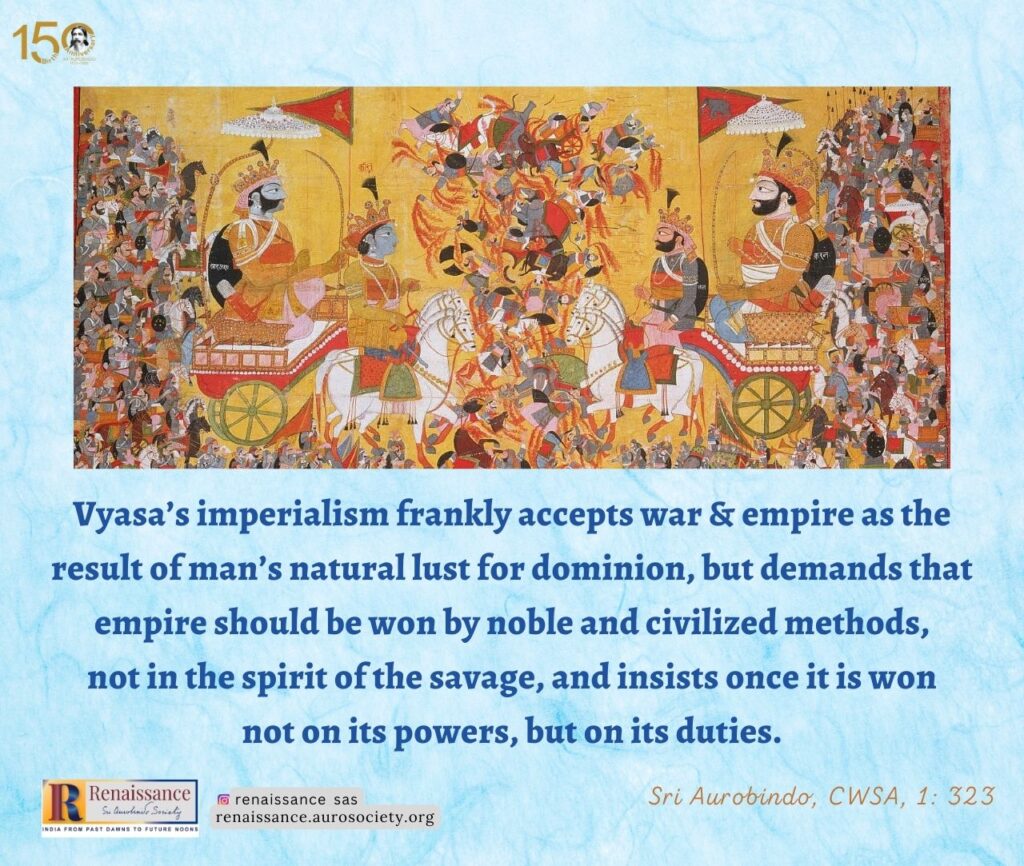
The means, of course, are as important as the ends. They should be based on unimpeachable dharma, and the hero’s name Dharmaraja is symbolic of this firm adherence to Righteousness in ancient Indian polity. Indeed, Sri Aurobindo even feels that Vyasa’s aim is to posit the several layers of human intellectual activity with reference to political administration of the land and “he [Yyasa] is interested in human action and character mainly as they move and work in relation to a large political background” (CWSA, Vol. 1, pp. 323-324).
Necessarily, this makes the characters of Vyasa so many types, though Sri Aurobindo hastens to add that the characters are not mere wooden pawns but individual human beings endowed with flesh and blood.
Nevertheless the characterisation, however reached, is admirable and firm. It is the fruit of a lifelong experience, the knowledge of a statesman who has had much to do with the ruling of men and has been himself a considerable part in some great revolution full of astonishing incidents and extraordinary characters.
~ CWSA, Vol. 1, p. 322
Not an arm-chair philosopher, nor a secluded visionary, but one who took an active part in the critical times that almost destroyed his nation in a cataclysmic internecine struggle; one who had seen wrong action, and had sought to uphold the right action; one who was close to actuality in the experience of day-to-day life: this deep involvement saw to it that Vyasa would be no dreamer of impossible utopias. Hence, too, his conclusions, with suitable modifications, are capable of direct application to a number of our own conditions today.
Sri Aurobindo had noted the social relevance of the Mahabharata for our own times. The characters of the epic, then, stand before us either as shining examples or as dire warnings.
His [Vyasa’s] very subject is one of practical ethics, the establishment of a Dharmyarajya, an empire of the just, by which is meant no millennium of the saints but the practical ideal of a government with righteousness, purity and unselfish toil for the common good as its saving principles….
Vyasa’s ethics like everything else in him takes a double stand on intellectual scrutiny and acceptance and on personal strength of character; his characters having once adopted by intellectual choice & in harmony with their temperaments a given line of conduct, throw the whole heroic force of their nature into its pursuit. He is therefore pre-eminently a poet of action.
~ CWSA, Vol. 1, p. 324
Not a purveyor of distant possibilities but a recorder of current reality!
We are in this world, and an ascetic denial is not going to help us or the world. But by living boldly and wisely, we can yet find the peace that is the reward of the contemplative.
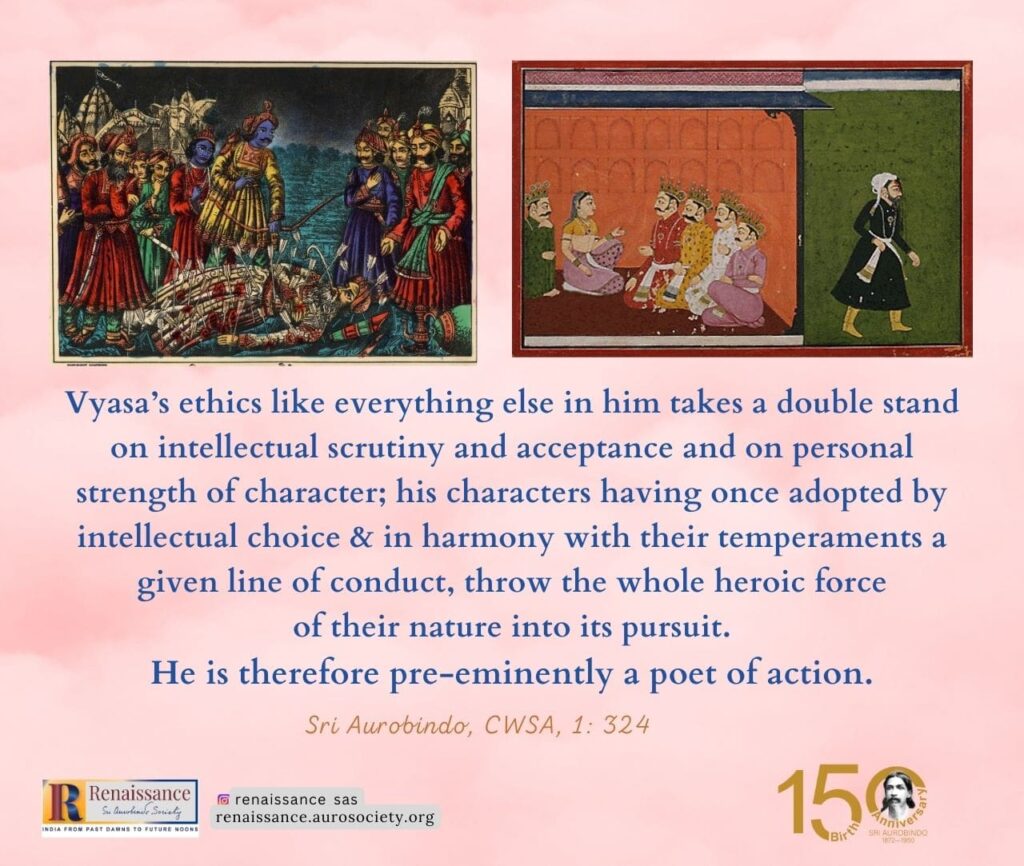
Apart from citing the familiar passage on action in the third chapter of the Gita, Sri Aurobindo quotes in detail from the Udyoga Parva to prove his point. Sanjaya goes to Upaplavya on behalf of Dhritarashtra and Bhishma to deliver a message of peace to the Pandavas. Yudhisthira, however, says that Krishna alone can speak with total knowledge about the nuances of action and renunciation. Krishna indicates his willingness to be an ambassador of peace to the Kuru Court but speaks out against renunciation. The world revolves on action. Even the unwinking Gods — Vayu, Surya, Chandra, Agni, Bhumi, the river goddesses and a host of other divinities — engage themselves in action to attain the highest.
अतन्द्रितो वर्षति भूरितेजाः सन्नादयन्नन्तरिक्षं दिशश्च ।
अतन्द्रितो ब्रह्मचर्यं चचार श्रेष्ठत्वमिच्छन्बलभिद्देवतानाम् ॥
हित्वा सुखं मनसश्च प्रियाणि तेन शक्रः कर्मणा श्रैष्ठ्यमाप ।
सत्यं धर्ममप्रमत्तो…
“The sleepless one of mighty strength (Indra) showers rain, resounding every corner and the cardinal points; and desiring kingship among the gods he practised the austerities of a Brahmacharya life, being sleepless. Giving up pleasure and the satisfaction of his desires, the position of a chief was obtained by Shakra by means of work. He strictly observed truth, virtue.” (The Mahabharata, Udyogaparva, 29.11-12, translated by Sri Manmatha Nath Dutt)
Action, then, but without attachment. Krishna gives himself as an example of a leader of the people who has to continue to act.
सक्ताः कर्मण्यविद्वांसो यथा कुर्वन्ति भारत ।
कुर्याद्विद्वांस्तथाऽसक्तश्चिकीर्षुर्लोकसंग्रहम् ॥
न बुद्धिभेदं जनयेदज्ञानां कर्मसङ्गिनाम् ।
जोषयेत्सर्वकर्माणि विद्वान्युक्तः समाचरन् ॥
What the ignorant do, O Bharata, with their minds enslaved to the work, that the wise man should do with a free mind to maintain the order of the world; the wise man should not upset the mind of the ignorant who are slaves of their deeds, but should apply himself to all works doing customary things with a mind in Yoga.”
(Gita, III, 25-26 , translated by Sri Aurobindo, CWSA, Vol. 1, p. 330)
Thus, in a swift movement, by unveiling the core message of the Mahabharata, Sri Aurobindo proved that it was a total mistake to think of the Indians as given solely to contemplation, a myth which is often used to explain away the poverty and non-development which keep India down. Sri Aurobindo has also referred to the emasculation of the Indian people in this context.
Buddhism with its exaggerated emphasis on quiescence & the quiescent virtue of self-abnegation, its unwise creation of a separate class of quiescents & illuminati, its sharp distinction between monks & laymen implying the infinite inferiority of the latter, its all too facile admission of men to the higher life and its relegation of worldly action to the lowest importance possible stands at the opposite pole from the gospel of Srikrishna and has had the very effect he deprecates; it has been the author of confusion and the destroyer of the peoples.
Under its influence half the nation moved in the direction of spiritual passivity & negation, the other by a natural reaction plunged deep into a splendid but enervating materialism.
~ CWSA, Vol. 1, pp. 330-331
Making a spirited call for a return to the “ancient heroic manhood” of our race, “its grasp on the world, its magnificently ordered polity and its noble social fabric”, Sri Aurobindo projected the Mahabharata as a Constitution in excelsis for taking India on the path of dharmic righteousness. Hence it is that, when dealing with the problem of the epic, the first chapter that Sri Aurobindo wrote was about ‘the political story’. He followed it up with a chapter on the ‘style and literary personality’ which did not proceed beyond a few paragraphs; and the larger plan to unravel ‘the problem of the Mahabharata’ remained unwritten.
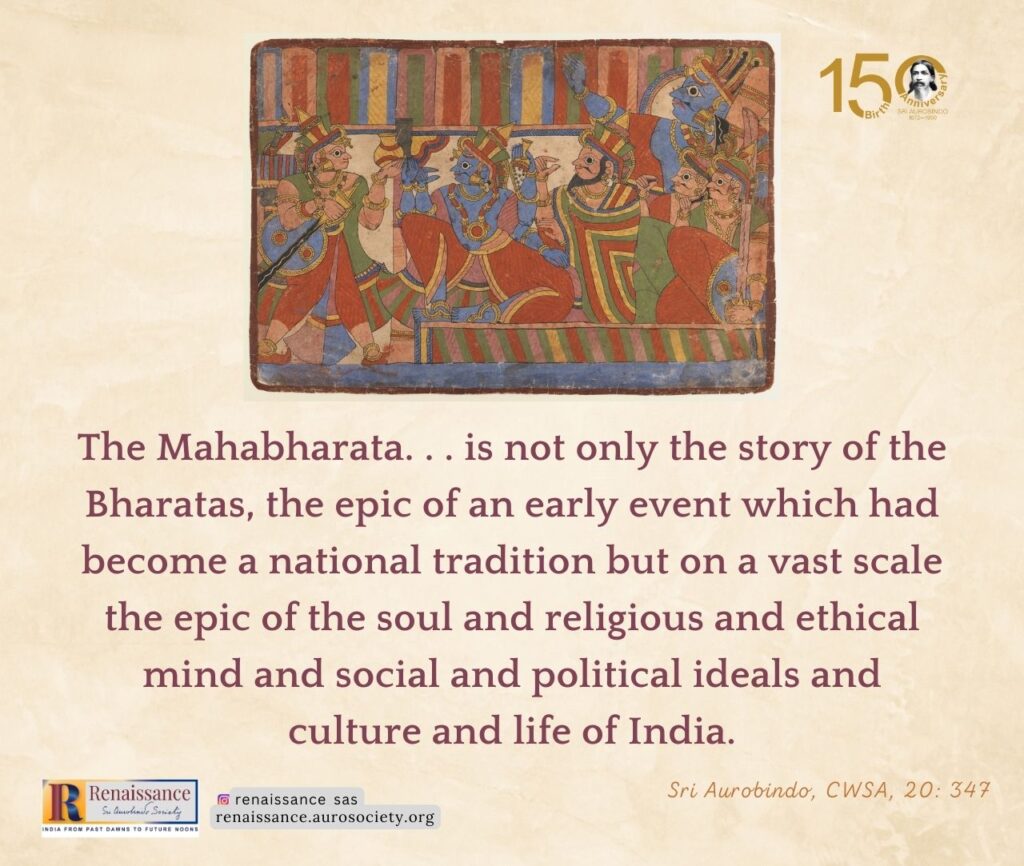
TO BE CONTINUED…
~ Design: Beloo Mehra
~ All images of Mahabharata paintings used in this feature are in public domain and are accessed through Wiki Commons.

